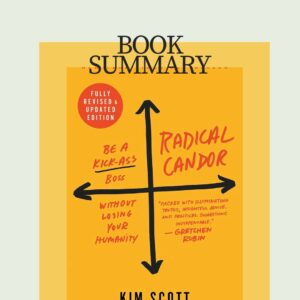Radical candor summary
Radical Candor emphasizes the significance of personally combining care with challenge directly in workplace communication. It is about developing a culture where individuals feel valued and supported while also being pushed to achieve their full potential. Within team structures, Radical Candor plays a crucial role in promoting transparency, building trust, and enhancing overall productivity.

Table of Contents
The Conceptual Framework of Radical Candor
The Quadrant Diagram of Radical Candor
- The quadrant diagram of Radical Candor consists of four main categories:
- Radical Candor: Offering honest feedback while showing genuine concern for the individual’s growth.
- Ruinous Empathy: Excessive focus on being kind at the expense of providing necessary feedback.
- Obnoxious Aggression: Criticizing or confronting without considering the individual’s feelings.
- Manipulative Insincerity: Engaging in insincere praise or feedback for personal gain.
Explanation of Each Quadrant
- Radical Candor: This quadrant embodies the essence of balancing care and challenge effectively. It involves providing clear, honest feedback while demonstrating genuine empathy towards the recipient.
- Ruinous Empathy: In this quadrant, individuals may hold back feedback to avoid hurting feelings, leading to a lack of growth and improvement opportunities.
- Obnoxious Aggression: This quadrant involves being overly critical or harsh in feedback delivery, which can damage relationships and hinder progress.
- Manipulative Insincerity: Here, individuals manipulate feedback to serve their own interests without genuinely caring for the recipient’s development.
The Principles of Radical Caring
Care Personally:
Care Personally emphasizes understanding the humanness of workplace relationships. It involves developing a genuine connection with team members, showing empathy, and recognizing their individuality beyond their professional roles. This principle forms the foundation for building trust and developing a supportive work environment.
Challenge Directly:
Challenge Directly revolves around providing feedback and communicating openly and directly with colleagues. It involves identifying areas for improvement, offering constructive criticism, and facilitating growth opportunities. By addressing issues head-on, individuals can overcome obstacles and reach their full potential.
Implementing Radical Candor in Workplace Communication
The Role of Radical Candor in Giving Feedback:
Radical Candor plays a pivotal role in facilitating constructive feedback exchanges within the workplace. By embracing honest and caring communication, individuals can address challenges, identify opportunities for growth, and enhance overall performance. This approach encourages team members to engage in open dialogue, leading to improved collaboration and problem-solving.
The Way It Creates a Positive and Open Communication Culture:
Implementing Radical Candor cultivates a positive and open communication culture within organizations. By promoting transparent conversations, acknowledging individual strengths, and addressing areas for development, teams can foster trust, creativity, and innovation. This culture of openness and respect paves the way for meaningful interactions and effective collaboration.
Impact of Radical Candor on Leadership
How Radical Candor Can Enhance Leadership Style:
Radical Candor offers leaders a framework to cultivate a culture of candid and supportive communication. By practicing Radical Candor, leaders can build strong relationships with team members, provide valuable feedback, and promote a growth-oriented mindset. This approach enables leaders to inspire and motivate their teams, driving performance and achieving organizational objectives.
Case Studies:
Radical Candor has been successfully implemented by various organizations, leading to significant improvements in leadership effectiveness and team dynamics. Case studies demonstrate how embracing Radical Candor can foster trust, increase employee engagement, and drive innovation. By highlighting real-world examples, these case studies illustrate the positive impact of Radical Candor on leadership and overall organizational success.
Mastering Radical Candor
Overcoming Barriers in Practicing Radical Candor
Radical Candor, although highly effective in promoting open communication and growth within teams, can face resistance due to various barriers. Let’s explore some common obstacles and how to overcome them:
Fear of Hurting Feelings
- Embracing Radical Candor involves being direct and honest in feedback, which can sometimes lead to concerns about hurting someone’s feelings.
- To overcome this barrier, it’s crucial to remember that Radical Candor is about caring personally while challenging directly. By showing empathy and respect in your communication, you can deliver feedback constructively without causing harm.
Misunderstanding the Concept
- Another challenge is the misunderstanding of what Radical Candor truly entails. Some may interpret it as being overly aggressive or critical.
- Address this barrier by educating team members on the principles of Radical Candor, emphasizing the balance between care and challenge. Encourage open dialogues to clarify any misconceptions and demonstrate how this approach can lead to positive growth.
Honing the Art of Radical Candor Feedback
Providing effective feedback through Radical Candor requires finesse and skill. Let’s delve into some strategies to master this essential aspect of developing a culture of open communication:
Tips for Providing Radical Candor Feedback
- Be Specific: Provide clear examples and details when giving feedback to ensure clarity and understanding.
- Focus on Behavior: Instead of making assumptions or judgments, concentrate on specific behaviors that can be improved or praised.
- Encourage Dialogue: Create a two-way conversation to engage in active listening and address any questions or concerns.
- Offer Support: Follow-up feedback with guidance and support to help the individual implement actionable steps for improvement.
- Seek Feedback Yourself: Solicit feedback on your feedback to continuously improve your communication approach and enhance effectiveness.
Role of Radical Candor in Conflict Resolution
Effective conflict resolution is paramount in maintaining harmonious relationships within teams. Radical Candor plays a pivotal role in addressing and resolving conflicts proactively:
Importance of Open Communication in Conflict Resolution
- Radical Candor promotes open and honest communication, which is instrumental in addressing underlying issues and resolving conflicts constructively.
- By encouraging team members to express their thoughts and feelings openly, Radical Candor creates a safe space for addressing conflicts early on, preventing escalation, and developing mutual understanding and empathy.
Radical Candor and Employee Engagement
Employee engagement is a critical factor in driving productivity and satisfaction within organizations. Let’s explore how Radical Candor can enhance employee engagement and contribute to a positive work environment:
Connection between Radical Candor and Employee Satisfaction
- Radical Candor fosters a culture of open communication, feedback, and growth, leading to increased employee satisfaction.
- By promoting transparency, trust, and constructive feedback, Radical Candor empowers employees to voice their opinions, address concerns, and actively contribute to achieving shared goals.
Evidence-based Research
- Studies have shown that organizations practicing Radical Candor experience higher levels of employee engagement, retention, and performance.
- Research demonstrates that when leaders and team members engage in open and honest dialogues, employees feel valued, motivated, and invested in their work, resulting in improved job satisfaction and overall engagement levels.
FAQs on Radical Candor
What is Radical Candor in the workplace?
Radical Candor is a communication philosophy that emphasizes caring personally while challenging directly. It involves providing honest feedback in a respectful and constructive manner to foster growth and open communication within teams.
How can Radical Candor benefit team structures?
Radical Candor can improve team dynamics by creating a culture of trust and transparency. When team members feel comfortable giving and receiving feedback, it leads to better collaboration, increased productivity, and a positive work environment.
What are the key principles of Radical Candor?
The key principles of Radical Candor are caring personally and challenging directly. This means understanding the human aspect of workplace relationships and being willing to provide honest feedback to help individuals grow professionally.
How can Radical Candor enhance leadership skills?
By practicing Radical Candor, leaders can build stronger relationships with their team members, improve communication, and create a supportive environment for growth and development. It enables leaders to address issues openly and guide their team towards success.
What are the common barriers to implementing Radical Candor?
Barriers to implementing Radical Candor may include fear of hurting feelings, misunderstandings about the concept, and challenges in delivering feedback effectively. Overcoming these barriers requires training, practice, and a commitment to developing open communication.
How does Radical Candor contribute to conflict resolution?
Radical Candor plays a crucial role in conflict resolution by encouraging open and honest communication. When individuals feel comfortable expressing their concerns and receiving feedback, it leads to constructive dialogue and the resolution of conflicts in a positive manner.
Is there evidence supporting Radical Candor’s impact on employee engagement?
Research suggests that organizations that promote Radical Candor experience higher levels of employee engagement and satisfaction. When employees feel heard, valued, and supported through honest feedback, they are more likely to be engaged and motivated in their work.
Conclusion
In conclusion, embracing Radical Candor can transform workplace communication, foster a culture of trust and feedback, enhance leadership skills, and boost employee engagement. By prioritizing open communication, empathy, and constructive feedback, organizations can create a positive and collaborative environment where individuals thrive and grow professionally.
Discover marketing services, interviews & publishing tools at SharingStories.



